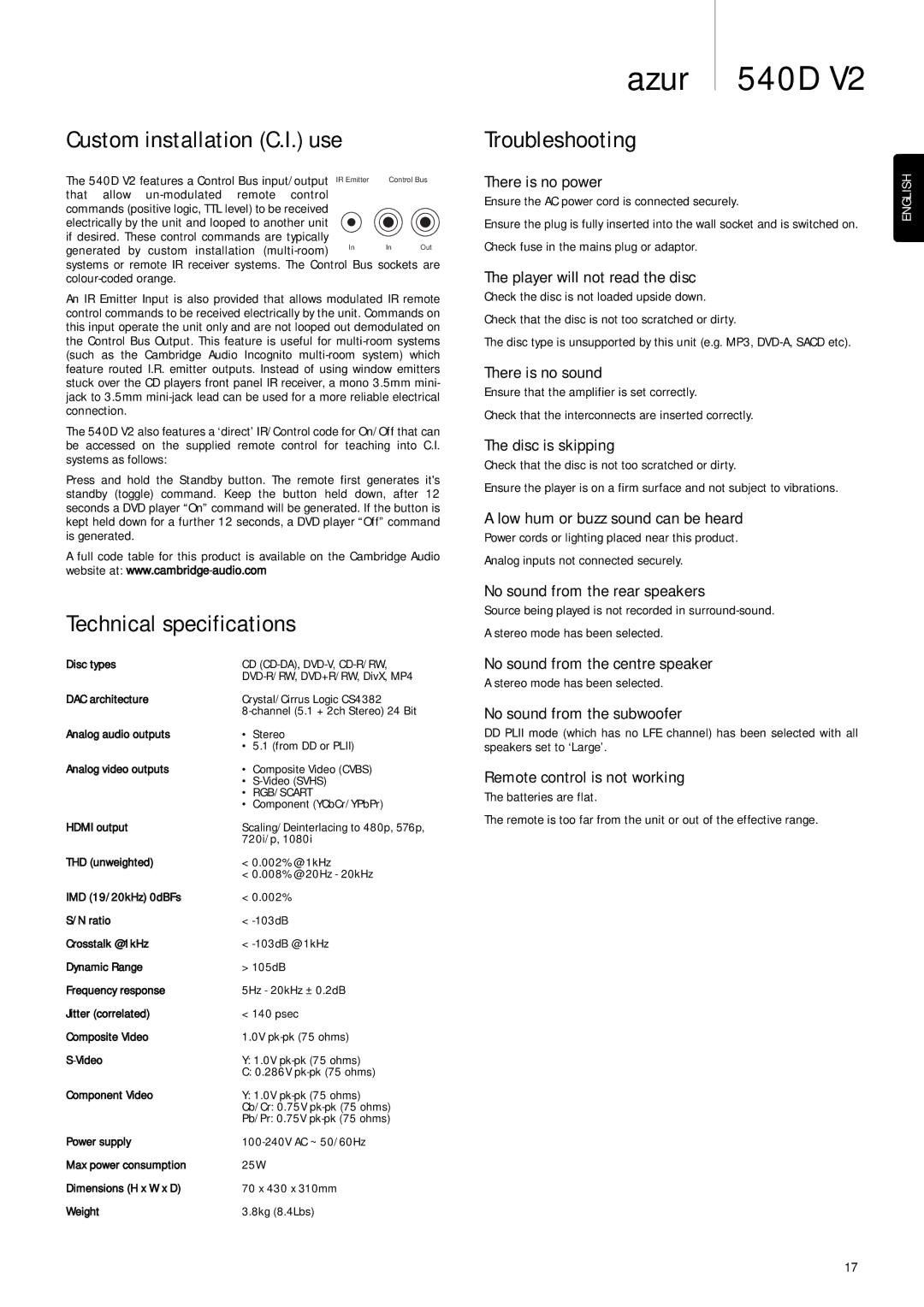
Custom installation (C.I.) use
The 540D V2 features a Control Bus input/output IR Emitter | Control Bus | ||
that allow |
|
|
|
commands (positive logic, TTL level) to be received |
|
|
|
electrically by the unit and looped to another unit |
|
|
|
if desired. These control commands are typically | In | In | Out |
generated by custom installation | |||
systems or remote IR receiver systems. The Control Bus sockets are
An IR Emitter Input is also provided that allows modulated IR remote control commands to be received electrically by the unit. Commands on this input operate the unit only and are not looped out demodulated on the Control Bus Output. This feature is useful for
The 540D V2 also features a ‘direct’ IR/Control code for On/Off that can be accessed on the supplied remote control for teaching into C.I. systems as follows:
Press and hold the Standby button. The remote first generates it's standby (toggle) command. Keep the button held down, after 12 seconds a DVD player “On” command will be generated. If the button is kept held down for a further 12 seconds, a DVD player “Off” command is generated.
A full code table for this product is available on the Cambridge Audio website at:
Technical specifications
Disc types | CD |
| |
DAC architecture | Crystal/Cirrus Logic CS4382 |
| |
Analog audio outputs | • Stereo |
| • 5.1 (from DD or PLII) |
Analog video outputs | • Composite Video (CVBS) |
| • |
| • RGB/SCART |
| • Component (YCbCr/YPbPr) |
HDMI output | Scaling/Deinterlacing to 480p, 576p, |
| 720i/p, 1080i |
THD (unweighted) | < 0.002% @ 1kHz |
| < 0.008% @ 20Hz - 20kHz |
IMD (19/20kHz) 0dBFs | < 0.002% |
S/N ratio | < |
Crosstalk @1kHz | < |
Dynamic Range | > 105dB |
Frequency response | 5Hz - 20kHz ± 0.2dB |
Jitter (correlated) | < 140 psec |
Composite Video | 1.0V |
Y: 1.0V | |
| C: 0.286V |
Component Video | Y: 1.0V |
| Cb/Cr: 0.75V |
| Pb/Pr: 0.75V |
Power supply | |
Max power consumption | 25W |
Dimensions (H x W x D) | 70 x 430 x 310mm |
Weight | 3.8kg (8.4Lbs) |
azur 540D V2
Troubleshooting
There is no power
Ensure the AC power cord is connected securely.
Ensure the plug is fully inserted into the wall socket and is switched on. Check fuse in the mains plug or adaptor.
The player will not read the disc
Check the disc is not loaded upside down.
Check that the disc is not too scratched or dirty.
The disc type is unsupported by this unit (e.g. MP3,
There is no sound
Ensure that the amplifier is set correctly.
Check that the interconnects are inserted correctly.
The disc is skipping
Check that the disc is not too scratched or dirty.
Ensure the player is on a firm surface and not subject to vibrations.
A low hum or buzz sound can be heard
Power cords or lighting placed near this product.
Analog inputs not connected securely.
No sound from the rear speakers
Source being played is not recorded in
A stereo mode has been selected.
No sound from the centre speaker
A stereo mode has been selected.
No sound from the subwoofer
DDPLII mode (which has no LFE channel) has been selected with all speakers set to ‘Large’.
Remote control is not working
The batteries are flat.
The remote is too far from the unit or out of the effective range.
ENGLISH
17
